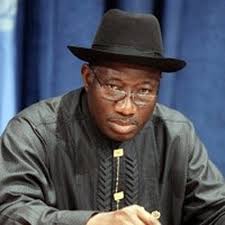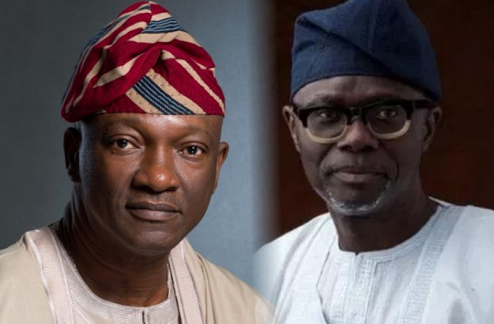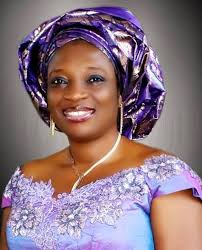$1.1b Malabu scandal: How Jonathan got $200m from deal

Former Nigerian President, Dr. Goodluck Jonathan, is yet to be free from his alleged involvement in the $1.1 billion Malabu scandal, as new report says he probably received as much as $200 million to approve the sale of OPL 245 oil field.
According to court documents presented by Italian prosecutors, Shell and ENI were also confirmed to have known that a huge amount from the $1.3 billion will be disbursed as compensation to Nigerian politicians, yet went ahead with the deal.
According to Italian newspaper, BuzzFeed, the prosecutors quoted Ednan Agaev, a Russian middleman who helped negotiate the transfer of the oil block to Shell and ENI, as saying that Dan Etete, the former Petroleum Minister at the heart of the oil scandal, said he intended to dole out as much as $400 million in bribes if the deal went through.
According to the paper, if Etete actually paid such amount as bribe to secure the bloc then, “Agaev stated that he would think President Goodluck Jonathan got at least $200 million of this money,” BuzzFeed quoted an excerpt of FBI submissions to Italian authorities as saying.
The revelations were made when the FBI interviewed Agaev, whom prosecutors also said met with Jonathan on more than one occasion in Nigeria during the OPL 245 negotiations.
Agaev, who was Etete’s representative in the negotiation, said the convicted former petroleum minister told him of the $400m bribe to Nigerian politicians when he approached him for his payment.
During FBI’s questioning, Agaev was asked about payment of his commission. He “stated that he went to Etete and told him to pay him the $65,000,000 fee”. Agaev stated that Etete said, ‘I can’t pay you, I have to pay Adoke (Mohammed Bello Adoke, then Nigeria’s attorney general) $400 million and all the other people in the Senate and the National Assembly.”
The Russian also repeated the assertion in a follow-up interview with Italian prosecutors, led by Fabio De Pasquale in Milan.
“I said that if it’s true, that he paid, he had to pay 400 million, I assume that at least 200 went to Goodluck (Jonathan).”
“I heard from Chief (Etete), he claims that he had to pay 400 million, so, if this is true, if he paid 400 million, then most probably the President, as the biggest boss, took at least the half of it,” BuzzFeed wrote, quoting documents prepared by Italian prosecutors.
The findings included internal emails and phone conversations of Shell’s officials and agents. It also revealed how Etete’s wife allegedly stated that her husband was getting only a part of the total sum paid by Shell.
“The rest goes in paying people off,” BuzzFeed reported.
The report also said Etete, at a 2010 meeting with Guy Colegate and John Copleston, two former British intelligence officers, hired by Shell to help handle Etete during the negotiations, said Jonathan had written to him about the president’s willingness to see the deal through.
“Etete claims he has and has shown (though not copied) a letter from President reiterating Malabu’s 100pc equity/contract ‘award’,” an email from Mr. Colegate stated. “This letter clearly an attempt to deliver significant revenues to GEJ (Jonathan) as part of any transaction.”
Shell officials said Jonathan worked as a lesson teacher to Etete’s children when he was Petroleum Minister from mid to late 1990s.
MI6 officials said the deal was “about personal gain and politics” for Jonathan.
The documents also revealed that Shell officials knew Etete was an ex-convict who intended to distribute the payment of the Malabu oil deal to politicians, but transacted with him, anyway.
At some point, the officials tried to exploit Etete’s criminal record to get a better deal for Shell.
In response to a 2007 note saying that a French court had just sentenced Etete to a jail term and a $440,000 fine for money laundering, a Shell general counsel forwarded the message to executive board members.
“Gentlemen, I thought the attached would be of interest to you,” he wrote. “We are considering how to turn this development to our advantage.”
Guy Outen, an executive vice president at Shell, replied: “makes it a bit difficult for the Govt … and us … to progress though,” BuzzFeed reported.
The details confirmed an earlier report that Shell and ENI knew they were dealing with Etete and that a good amount of their payment will go to Malabu Oil and Gas, partly-owned by the former petroleum minister.
Responding to BuzzFeed and Il Sore 24 Ore, Shell and ENI said the authorities have no grounds to pursue their prosecution.
“Based on our review of the Prosecutor of Milan’s file and all of the information and facts available to Shell, we do not believe that there is a basis to prosecute Shell.
“Furthermore, we are not aware of any evidence to support a case against any former or current Shell employee.
“If the evidence ultimately proves that improper payments were made by Malabu or others to then current government officials in exchange for improper conduct relating to the 2011 settlement of the long-standing legal disputes, it is Shell’s position that none of those payments were made with its knowledge, authorization or on its behalf,” Shell said.
In its response, ENI also struck a similarly defiant tone.
“Neither ENI nor Shell paid any monies other than as contemplated and recorded by the Block Resolution Agreement and did not pay to Malabu, to Chief Dan Etete or to any public officer. ENI is not involved in any investigation in The Netherlands …
“The payments made by ENI and Shell to the Nigerian government for title to OPL 245 were made to an escrow account with an international bank held by the Federal Government of Nigeria pursuant to the Block 245 Resolution Agreement.
“Neither ENI nor Shell paid any monies other than as contemplated and recorded by the Block Resolution Agreement and did not pay to Malabu, to Chief Dan Etete or to any public officer,” it said.
However, Italian prosecutors said they had enough evidences to sue Shell, ENI and Agip, and their officials, including other Nigerians involved in the fraud.
Last year, they filed charges against Etete, Agaev and DescaJzi Claudio, the CEO of Eni; his predecessor, Paolo Scaroni; Roberto Casula, Armanna Vincenzo, Antonio Pagano, Luigi Bisignani and Falcioni Gianfranco.
BuzzFeed quoted De Pasquale as stating in court filings that it was reasonable to describe the Malabu oil deal as “anomalous or suspicious” as it “reasonably appear to be connected to contexts of bribery”.
A Milan court will decide if the matter will go on trial later this month.
Following former Attorney-General of Nigeria, Adoke’s involvement in the $1.1 billion Malabu scandal, the Economic and Financial Crimes Commission (EFCC) had approached the Abuja Division of the Federal High Court, with a request to force former Justice Minister, Mohammed Adoke, to attend his ongoing trial.
Adoke and a former Minister of Petroleum, Dan Etete, and other defendants are currently facing trial for alleged diversion of $1.1 billion in the OPL 245 oil bloc belonging to Nigeria, leased to a company linked to Etete.
The counsel representing the EFCC, Johnson Ojogbane, made the application during a hearing before Justice John Tsoho.
However, the judge declined because according to him, other parties to the matter were not in court, and had not been served with the notice of summons for Ojogbane’s motion.
Afterwards, the EFCC’s lawyer requested a long adjournment to allow his client sufficient time to serve the necessary notice of summons to all the defendants. The case was adjourned till June 13.
In March, Bello Adoke, dragged ex-Nigerian president, Olusegun Obasanjo into the $1.1 billion Malabu deal.
In a petitioned sent to the Attorney-General of Nigeria, Abubakar Malami, Adoke called out the Economic and Financial Crimes Commission, accusing it of favouritism.
Adoke accused the EFCC for allegedly singling him out for trial, leaving out other former high-level government officials, including former President Olusegun Obasanjo.
According to Adoke, Obasanjo took some of the important decisions that resulted into the controversial $1.1 billion Malabu deal.
“I believe it is your responsibility to explain to the public who are being sold a fiction that the transaction started from President Olusegun Obasanjo, GCFR under whose administration the Terms of Settlement were brokered with Chief Bayo Ojo, SAN, as the then Attorney General who executed the Terms of Settlement before the tenure of President Goodluck Ebele Jonathan, GCFR who approved the final implementation of the Terms of Settlement and my humble self who executed the resolution agreements,” Mr. Adoke said in the petition dated March 6.
The appeal was sent three days after Adoke accused the EFCC of being manipulated by powerful political canals, after the anti-graft agency filed fresh charges of money laundering against him and one of his associates, Aliyu Abubakar, accusing them of sharing millions of dollars in fraudulent proceeds.
In the charges, filed at the Abuja Division of the Federal High Court, the EFCC alleged that Adoke exchanged more than $2.2 million in a bureau de change in Abuja as part of his share in the controversial $1.1 billion Malabu Oil deal.
Prosecutors believe Abubakar, a controversial owner of A.A. Oil Ltd., acted as middleman in the questionable deal.
The EFCC said in the court filings that Adoke took delivery of exactly $2,267,400 on September 16, 2013, and immediately enlisted the service of money changers to have it converted to the local currency.
On the prevailing exchange rate at the time, Adoke made N345, 200,000 after converting the money, after which he deposited all the money in a Unity Bank account to offset an outstanding overdraft of N300 million, court documents showed.
However, Adoke denied all allegations at the time, saying the EFCC knew the facts of the case but intentionally muddled them up to confuse “gullible” Nigerians and soil his image.
In his petition to Malami, the former AGF begged his successor to save him from “unwarranted attacks and dehumanising treatment” just because he “chose to serve” his “fatherland.”
He reminded Attorney-General about former government officials who took part in the controversial deal and approvals they allegedly gave.
He queried why the EFCC had not invited those officials, especially since they did not deny their alleged roles.
Again, Adoke said he was not guilty, saying he saved Nigeria more than $2 billion in damages that resulted from arbitration claims instituted against the Nigerian government at the International Centre for Settlement of Investment Disputes over the OPL 245 block, which is believed to hold more than 9 billion barrels of crude oil and even more volumes of natural gas.
Adoke was instrumental to Nigerian government’s involvement in the suspicious Malabu Oil deal, which saw Shell and Agip-Eni paying money into an escrow account of the Nigerian government to settle a firm with a questionable history.
Adoke authorised the transfer of the $1.1 billion paid by Shell and Eni into private accounts of Etete, who further transferred a large percentage to Abubakar. Investigations suggested that Abubakar might have acted as a front for officials of the Goodluck Jonathan administration, including Adoke.
Shell, Agip-Eni, Adoke and Etete, who initially approved the lease award of the OPL 245 while he was petroleum minister in 1998, have all denied wrongdoings.
However, Italian prosecutors, said in 2016, that they had clear evidences to charge Shell, Agip, Eni, their officials and other Nigerians involved in the deal.
EFCC then in 2016, accused Adoke, Etete of defrauding Nigeria in the OPL 245 deal.
According to the Department of Petroleum Resources in 2016, Adoke and other officials of the Jonathan administration who participated in the concession of the lucrative oil field to Shell and Agip-Eni did not follow due process.
Adoke, who is currently in the Netherlands for study, had denied all allegations, and had promised to appear in court for trial.
Recently, following a court order that the richest oil bloc in Nigeria, OPL 245, should be returned to Nigeria, multinational oil companies, Shell and ENI, dragged the Federal Government to court to reclaim the oil bloc.
On January 26, Justice John Tsoho of the Federal High Court, granted Nigeria an interim order as sought by the EFCC to take over the oil bloc estimated to contain over 9 billion barrels of crude.
However, Shell and ENI, through their Nigerian subsidiaries, asked a Federal High Court to reverse the order that forced them to forfeit OPL 245.
Obasanjo is not the first to be implicated in the deal.
Adoke had accused President Jonathan also taking part in the deal.
Etete was said to have transferred over half of the money into accounts of fake companies controlled by Aliyu Abubakar, a man is wanted for fraud in Italy and whom the EFCC already charged for fraud.
Abubakar is believed to be a front for several top officials of the Goodluck Jonathan administration including Jonathan and his attorney general, Bello Adoke.
After being named in the $1b Malabu Oil deal, former President Goodluck Jonathan denied all allegations of involvement in the deal although the oil transaction took place during his tenure.
In a statement by his spokesperson, Ikechukwu Eze, in Abuja, the former president denied sending Abubakar Aliyu or any other person to receive bribe on his behalf.
According to the release, Jonathan also said he did not hold any secret meeting with parties involved in the transaction.
Jonathan then referred his accusers to cross check the document which was signed during the deal at the office of the Attorney General of the Federation/Minister of Justice.
Jonathan also denied owning any bank account or properties outside the country.
The former president then challenged anybody with concrete evidences against him to step up with them.
Italian authorities also said they will file criminal charges against former Minister of Petroleum, Dan Etete, for his involvement in the oil deal.
The notice of trial came one week after he was charged by the Economic and Financial Crimes Commission, EFCC in Abuja.
Etete confessed to a British court in 2013 that former President, Olusegun Obasanjo, demanded part of the oil block as bribe.
Despite evidences showing that Shell and ENI are aware that the money would be paid to a questionable character, officials of the companies have denied any wrong doing in the affair.
For instance prosecutors said that a senior official of Shell had a face-to-face meeting with Etete over expensive “lunch and lots of iced champagne” few months before the money was transferred into a Nigerian government’s account.
Also, an email presented during the trial also mentioned that the Shell official who related with Etete would refer to someone in The Hague known as “Peter” over the terms of the deal.
By 2010, Etete had schemed out other owners of Malabu including by fraudulently altering Corporate Affairs Corporation, CAC, documents, investigations revealed.
The CAC recently said its official in charge of the Malabu documents was “brutally murdered”.








